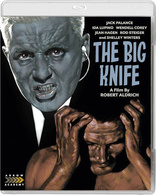The Big Knife Blu-ray Movie
HomeThe Big Knife Blu-ray Movie 
Arrow AcademyArrow | 1955 | 111 min | Not rated | Sep 12, 2017
Movie rating
6.7 | / 10 |
Blu-ray rating
| Users | 0.0 | |
| Reviewer | 3.5 | |
| Overall | 3.5 |
Overview
The Big Knife (1955)
Charles Castle is a successful Hollywood actor who has opted for screen success over art. He must make critical decisions regarding his career, his marriage, his art & morality. In this screen adaptation of a Clifford Odets play, Castle is pressured by his studio boss and manipulated into a potentially murderous cover-up to protect his career. An indictment of the amoral world of 50's Hollywood and its corrosive effect upon the artist.
Starring: Jack Palance, Ida Lupino, Wendell Corey, Jean Hagen, Rod SteigerNarrator: Richard Boone (I)
Director: Robert Aldrich
| Film-Noir | Uncertain |
| Crime | Uncertain |
| Drama | Uncertain |
Specifications
Video
Video codec: MPEG-4 AVC
Video resolution: 1080p
Aspect ratio: 1.85:1
Original aspect ratio: 1.85:1
Audio
English: LPCM 2.0 Mono (48kHz, 24-bit)
Subtitles
English SDH
Discs
Blu-ray Disc
Single disc (1 BD)
Playback
Region A, B (C untested)
Review
Rating summary
| Movie | 3.5 | |
| Video | 4.0 | |
| Audio | 4.0 | |
| Extras | 2.5 | |
| Overall | 3.5 |
The Big Knife Blu-ray Movie Review
Francis?
Reviewed by Jeffrey Kauffman September 8, 2017While The Big Knife features a focal movie star who’s a male, and the plot developments include a number of lurid and increasingly melodramatic elements that might be considered unbelievable, I’ve long wondered if Clifford Odets was actually thinking of his erstwhile lover Frances Farmer when he wrote the play on which the film is based, since it deals with a magnetic and charismatic film star on a seemingly perilous downward spiral caused at least in part by the corrosive atmosphere of Hollywood. Odets’ work often dealt with the conflict between Art and Commerce, and in fact Golden Boy, Odets’ 1937 Broadway success (the biggest of his career, actually) which starred Farmer as Lorna Moon, had that very premise in its core tale of a conflicted violinist who also turned out to be a pretty darn good boxer. (Boxing recurs in this film as well in a couple of ways, including in a "film within the film".) But Odets, much like Farmer, tended to frequently look askance at Hollywood, seeing it as the dreaded “Commerce” part of the equation when perhaps New York’s theatrical environment provided more of the “Art” aspect. Farmer’s meteoric rise to Hollywood stardom and, just a short time later, Broadway fame, followed by her equally spectacular crash into mental illness and years of institutionalization may have provided a spark of inspiration for Odets, and in fact there’s quite a bit of documentary evidence that Odets had long been interested in using part of Farmer’s story for some kind of theatrical or cinematic treatment. Due to my longstanding research on Farmer, I have some really interesting private letters between Odets and Farmer, who continued to stay in touch even after their affair had ended, and there is more than one passing comment about what both of them saw as the soul crushing and depressing strictures caused by being in the Hollywood machine (more so for Farmer, who, after Golden Boy was never really able to achieve another outstanding stage success, and found herself attempting to rebuild her Los Angeles life after having thumbed her nose at it just a couple of years previously). The fact that The Big Knife also has a major plot point dealing with a drunk driving incident, something that is germane to Farmer's fall from grace, may also indicate that Odets was drawing on at least some real life events as he fashioned a saga of a movie icon with an alliterative name in the same mold as Frances Farmer, Charlie Castle (Jack Palance), whose once perfect life unravels in a number of unexpected ways over the course of the film.
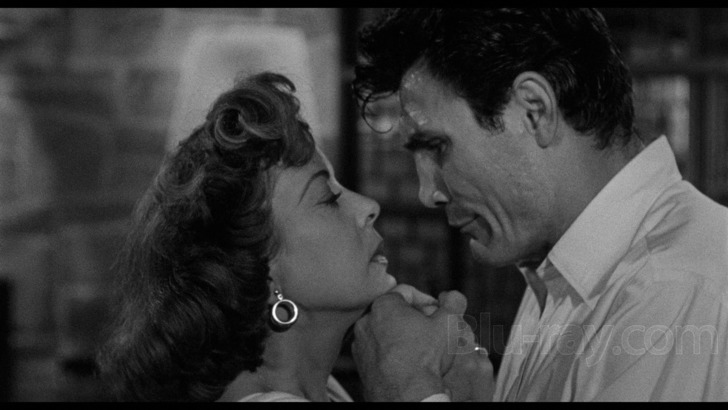
Castle is working out at his luxe Hollywood mansion as the film opens, though his manager Buddy Bliss (Paul Langton) is concerned about another kind of “boxing match”, namely one between Charlie and hoity toity gossip columnist Patty Benedict (Ilka Chase), a kind of imperious cross between Hedda Hopper and Louella Parsons. Benedict has caught wind of some discord in the marriage between Charlie and his wife Marion (Ida Lupino, interestingly a personal friend of Frances Farmer’s who attempted to option Farmer’s supposed autobiography Will There Really Be a Morning as a directorial assignment in the 1970s). Charlie and Marion are in fact on the verge of a divorce, and Patty wants that scoop all to herself. An unrepentant Marion tells the columnist that the status of the Castle marriage is none of her business, sending Patty scurrying off in a huff, but not before she calmly threatens to rake some muck involving a long ago drunk driving arrest involving Buddy and an unfortunate hit and run.
Marion is willing to give Charlie another chance at rescuing their marriage, despite some passing allusions to extramarital dalliances on his part, but only if he refuses to sign another stultifying seven year contract with blowhard studio impresario Stanley Shriner Hoff (Rod Steiger, not just chewing the scenery but basically devouring it whole). A brief conversation between Marion and Charlie recounts a number of (real life) Hollywood types who were able to forge Art in the world of Commerce, but both Castles agree that Hoff doesn’t make the grade in that regard, being interested only in the cold, hard cash his lowbrow entertainments result in.
Unfortunately for Charlie, Hoff, like most studio bigwigs, has the inside track on his “property” (i.e., the actors contracted to work for him), and he and his smarmy assistant Smiley Coy (Wendell Corey) know some secrets about that long ago hit and run that could ruin Charlie’s life, let alone his career. In some plot points that seem lifted whole cloth from some of Farmer’s desires, Charlie begs his agent Nat Danziger (Everett Sloane) to arrange for his freedom so that he can pursue roles which will fulfill him artistically.
Up to this point, James Poe’s adaptive screenplay rather smartly documents the conflicts, both internal and external, that Charlie is facing, but unfortunately the material tips over into increasingly fanciful and ultimately overly melodramatic aspects that tend to undercut its main message. The whole drunk driving issue comes back to haunt Charlie repeatedly, including courtesy of a floozy named Dixie Evans (Shelley Winters), but there are also arguably unnecessary subplots involving Marion’s potential romance with a writer and Charlie’s dalliance with Buddy’s wife Connie (Jean Hagen). While these events certainly display the moral turpitude that many associate with Hollywood, they don’t materially add to the central story of Charlie questing for Art rather than Commerce.
In a way, The Big Knife presages another, better remembered, film from director Robert Aldrich, What Ever Happened to Baby Jane?. Both films pick at the scab of Hollywood fame and fortune, exposing some raw emotional material that results when real life doesn't match a pretend perfect world. The Big Knife is the resolutely more “realistic” of the two films, despite its hyperbolic tendencies, but in a way that tends to make its denouement less cathartic than in the later film. One way or the other, Aldrich, along with Odets (and, probably, the spirit of Farmer) want you to know that while there are endings in Hollywood (in more ways than one), more often than not they are not happy.
Note: I don't have the DVD of this and so can't confirm online reports that the Blu-ray is missing some footage.
The Big Knife Blu-ray Movie, Video Quality 
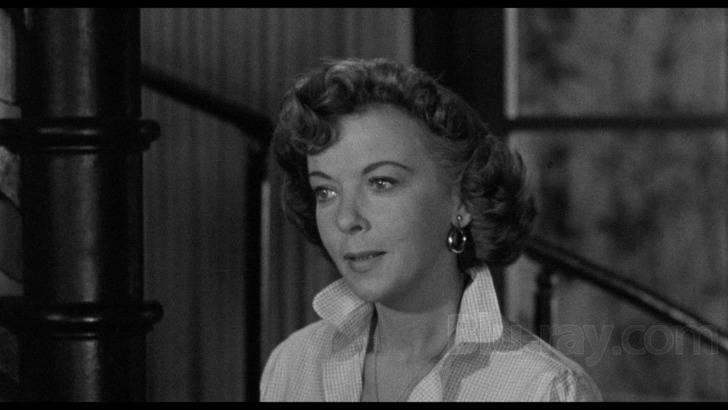
The Big Knife is presented on Blu-ray courtesy of Arrow Academy with an AVC encoded 1080p transfer in 1.85:1. Arrow's typically informative insert booklet has the following information on the transfer:
The Big Knife has been exclusively restored in 2K Resolution for this release by Arrow Films. The film is presented in its original theatrical aspect ratio of 1.85:1 with mono sound.With an understanding of the source element utilized, this is a really excellent looking transfer, albeit one with perhaps a trifle more grain than some might expect. There are very slight variances in clarity at certain occasions, including one brief outdoor scene (see screenshot 12), but on the whole detail levels and sharpness are typically very good. Contrast is also solid, and Ernest Laszlo's often inventive framings are delivered with generally excellent precision and without any compression anomalies. Those framings frequently feature extreme close-ups (often in the corner of the frame), something that tends to elevate already good fine detail levels. A few very minor blemishes have made it through the restoration gauntlet intact, but they're not problematic in any major way.
An original 35mm fine grain positive was scanned in 2K resolution on a pin-registered 4K Lasergraphics Director Scanner at Deluxe's EFilm facility in Burbank. Picture grading was completed on the Nucoda Grading System. Picture restoration was performed using Phoenix and PF Clean software. The soundtrack was sourced from the combined fine grain element. All grading and restoration work was completed at R3:Store Studios, London.
The Big Knife Blu-ray Movie, Audio Quality 
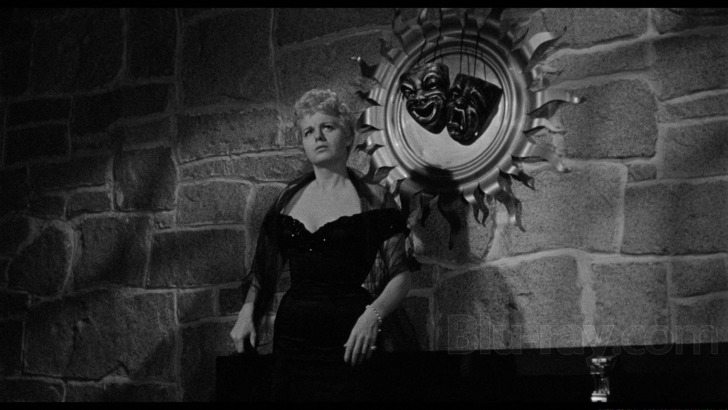
The Big Knife is, like many Odets outings, a pretty talky affair, and as such the LPCM 2.0 mono mix suffices quite well despite being inherently narrow. There are a few scattered cues by Frank DeVol which sound fine, and all dialogue is rendered cleanly without any age related issues whatsoever.
The Big Knife Blu-ray Movie, Special Features and Extras 
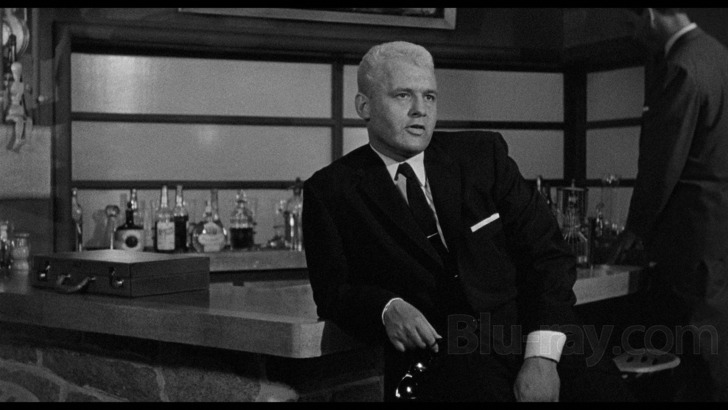
- Commentary by Glenn Kenny and Nick Pinkerton
- Bass on Titles (1080i; 33:46) is an engaging archival interview with Saul Bass from 1977.
- Television Promo (1080p; 4:59) is its era's version of an EPK.
- Theatrical Trailer (1080p; 2:28)
The Big Knife Blu-ray Movie, Overall Score and Recommendation 
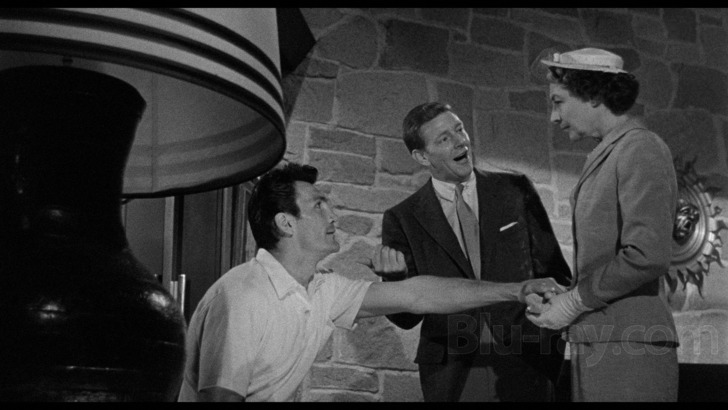
The Big Knife's short Broadway life has connections to Frances Farmer other than Odets, including director Lee Strasberg and star John Garfield, both of whom had worked with her in various capacities, and it's hard not to think that her story was at least discussed between these folks, especially since in 1949, when the play ran on Broadway, Farmer was still a patient at Western State Hospital in Washington and the vagaries of her downfall may have seemed more relevant to the play's subtext of Hollywood's toxic properties. (By the time the film arrived in 1955, Farmer had been released from Western State, had remarried — though she would soon divorce — and was about to "hide out" in Eureka, California for a couple of years before embarking on her comeback in the late fifties.) But while perhaps the most personal example of that toxicity known to Odets and his cohorts, Farmer's tale is certainly not the only sad incident of fame and fortune eating away at someone's soul until only tatters are left. The Big Knife is a little too over the top once it gets to murderous conspiracies, but the film is a typically Odetsian examination of an artist under duress by forces of the marketplace and features his typically pungent dialogue style. Technical merits are generally strong, and while not bounteous the supplements are quite enjoyable as well. Recommended.
Similar titles
Similar titles you might also like

Cutter's Way
Limited Edition to 3000
1981

Sweet Smell of Success
1957

The Naked City
1948

Busting
Limited Edition Reissue
1974

The Shadow on the Window
1957

Too Late for Tears
1949

She Played with Fire
1957

High Sierra
1941

On Dangerous Ground
Warner Archive Collection
1951

Stray Dog
野良犬 / Nora inu
1949

Kiss the Blood Off My Hands
1948

Underground
1928

Shopping
1994

Side Street
Warner Archive Collection
1949

Hard Eight 4K
1996

Live by Night
2016

Private Hell 36
1954

Riot in Cell Block 11
1954

Brute Force
1947

Night and the City
American and British Versions
1950
